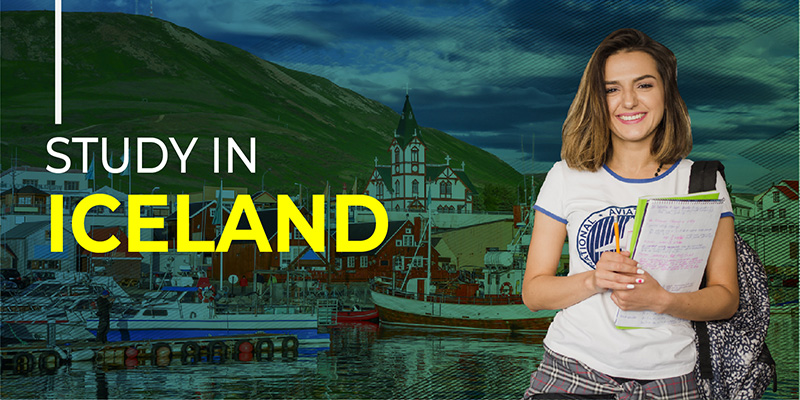This article will discuss international students’ access to tuition-free universities in Iceland.
Various universities in Iceland guarantee affordable, high-quality education.
It’s not surprising that more and more students are choosing Iceland as their study abroad destination, given the gorgeous landscape.
If you are one of these hopeful students, select a school from this list of affordable universities in Iceland for international students.
Iceland is an island located in Northern Europe’s Atlanta Ocean.
It is a member of the Scandinavian Union, which also consists of the Faroe Islands, Denmark, Sweden, Finland, and Norway.
Iceland is renowned as the “country of fire and ice” because of its numerous volcanoes, hot springs, and glaciers.

What Is Tuition Free Universities in Iceland
A college with no tuition is both free and not accessible at the same time.
To maintain the viability of their institution, they only charge minimum administrative and examination costs.
There are no fees associated with tuition, instruction, or textbooks.
What Conditions Must You Meet to Attend School in Iceland?
To enroll in a bachelor’s program in Iceland, you must possess a high school diploma, have passed the matriculation exam, or have an equivalent.
You might be required to submit more paperwork, take an admission exam, or participate in an interview, depending on the school or the course.
For a Master’s degree, having a Bachelor’s degree in the discipline is the main prerequisite.
Graduate students may be required to submit additional documentary requirements, just like undergraduate applicants.
List of 10 Tuition-Free Universities in Iceland For International Students
1. ICELAND UNIVERSITY
Háskóli islands (University of Iceland), a non-profit public higher education institution, was established in 1911 and is situated in the urban environment of the significant town of Reykjavik (population range: 50,000–249,999) in the Capital Region.
Háskóli islands (UI) is a large (uniRank enrollment range: 15,000-19,999 students) coeducational higher education institution that has been accredited or recognized by the Mennta- og menningarmálaráuneyti (Ministry of Education, Science, and Culture, Iceland).
In numerous fields of study, Háskóli islands (UI) offers courses and programs leading to officially recognized degrees in higher education, such as pre-bachelor degrees (certificates, diplomas, associate or foundation degrees), bachelor degrees, master degrees, and doctorate degrees.
For further information, see the uniRank degree levels and areas of study matrix below.
This 107-year-old school of higher learning maintains stringent admissions criteria based on applicants’ prior academic performance and ratings.
The range for admission rates is 80–90%.
2. REYKJAVIK UNIVESITY.
Reykjavik University, a for-profit private higher education school founded in 1998, is situated in the urban environment of the significant town of Reykjavik (population range: 50,000–249,999) in the Capital Region.
Háskólinn Reykjavk (RU) is a small (uniRank enrollment range: 2,000-2,999 students) coeducational higher education institution that has been officially certified and recognized by the Mennta- og menningarmálaráuneyti (Ministry of Education, Science, and Culture, Iceland).
Pre-bachelor degrees (i.e., certificates, diplomas, associate or foundation degrees) are among the higher education degrees offered by Háskólinn Reykjavk (RU).
Degrees such as bachelors and masters in many fields of study.
For further information, see the uniRank degree levels and areas of study matrix below.
This higher education school, which is 20 years old, offers stringent admissions criteria based on applicants’ prior academic performance and grades.
The range of admission rates is 40–50%.
3. AKUREYRI UNIVERSITY
Háskólinn á Akureyri (University of Akureyri), founded in 1987, is a non-profit public higher education institution in the urban area of the Northeastern Region’s medium-sized town of Akureyri (population range of 10,000–49,999).
Háskólinn á Akureyri (UA) is a relatively tiny (uniRank enrollment range: 1,000-1,999 students) coeducational higher education institution that has been officially accredited and recognized by the Mennta- og menningarmálaráuneyti (Ministry of Education, Science, and Culture, Iceland).
In numerous fields of study, Háskólinn á Akureyri (UA) offers courses and programs that lead to officially recognized degrees in higher education.
For further information, see the uniRank degree levels and areas of study matrix below.
4. BIFROST UNIV.
Háskólinn á Bifröst, often known as Bifröst University, is a non-profit private school of higher learning that was established in 1918 and is situated in the small rural community of Borgarnes in the Western Region.
Háskólinn á Bifröst (Bifröst) is a relatively tiny (uniRank enrollment range: 500-999 students) coeducational higher education institution that has been officially certified and recognized by the Mennta- og menningarmálaráuneyti (Ministry of Education, Science, and Culture, Iceland).
Courses and programs at Haskólinn á Bifröst (Bifröst) lead to degrees in higher education that are officially recognized, including bachelor’s and master’s degrees in Several fields of study.
For further information, see the uniRank degree levels and areas of study matrix below.
This higher, 100-year-old
The admissions process at educational institutions is selective and is based on applicants’ prior academic performance and grades.
The range of admission rates is 30%–40%.
5. Iceland Academy
Listaháskóli islands (Iceland Academy of the Arts), a private higher education school, was founded in 1998 and is situated in the capital region’s central city of Reykjavik (population range: 50,000–249,999).
Listaháskóli islands is a very tiny (uniRank enrollment range: 250-499 students) coeducational higher education institution that has been officially certified or recognized by the Mennta- og menningarmálaráuneyti (Ministry of Education, Science, and Culture, Iceland).
Listaháskóli islands provide programs and courses that officially recognize degrees from higher education, like bachelor’s degrees in several fields of study.
For further information, see the uniRank degree levels and areas of study matrix below.
6. Icelandic Agricultural University.
College fees for undergraduates:
ISK 75,000 ($580) (registration fee)
Per Annum
Fees for Graduate School:
ISK 75,000 ($580) (registration fee)
Per Annum
The Agricultural Institution of Iceland is a free public university in Iceland that is associated with the NOVA network.
It was established in 2005 and is among Iceland’s newest institutions.
Despite its youth, AUI has expertise in uncommon areas among colleges.
These include agriculture, equine science, natural and environmental science, forest science, and landscape architecture at the undergraduate level.
Planning and environmental changes master’s degrees are also available from AUI.
7. Hólar College University
Fees for undergraduate studies:
Cost of registration: ISK 75,000 ($580).
Each Year
Graduate tuition costs: ISK 75,000 ($580) for registration.
Each Year
Hólar University College is the next institution on our list of inexpensive universities in Iceland.
Given that it was established in 1106 as a cathedral school, it is one of the oldest educational institutions in Europe.
It finally adopted the name Hólar Agricultural College until adopting its present name in 2007.
The Hólar University College, situated in a tiny area of Northern Iceland, has three learning paths: aquaculture & fish biology, equine studies, and tourism studies.
The university also conducts a study in these many fields.
There are currently contemporary facilities, such as the Biodiversity Lab and Aquaculture Lab.
Additionally, it dabbles in horse breeding, riding, and training.
8. Iceland University of the Arts comes.
Undergraduate tuition costs ISK 600 ($5) per year.
Graduate tuition is ISK 600 ($5) per year.
An Iceland University of the Arts has a Reykjavik campus specializing in visual arts education.
The private university’s doors were formally opened for the first time in 1998, following the merger of the Reykjavik Arts School and the Iceland Drama School.
Here, less than 500 students from around the world and the local community can pursue specializations in design, art education, music, fine arts, dance, and theater.
9. Energy School of Iceland
Iceland School of Energy brings together the best of business and academia to provide students with a unique and comprehensive educational experience.
Thanks to a wide curriculum taught by professionals in their fields, students have access to a choice of possibilities and can design personalized study plans.
The main objective is collaborating closely with sector specialists while maintaining high-quality work.
The Icelandic Energy Institute is housed at the Faculty of Science and Engineering of the University of Reykjavik in Iceland and has received accreditation from that institution.
10. Westfjords University Centre
Founded in 2005 and opening its doors in January 2006, the University Centre of the Westfjords is a modest higher education institution.
In addition to the teachers who work freelance, the University Centre employs an average of six individuals.
More than 50 individuals working in research, teaching, and other roles for numerous businesses and organizations are based at the University Centre building.
How to Apply for Tuition Free Universities in Iceland For International Students
Applications are sent directly to the higher education institution you are interested in for undergraduate (first cycle) and graduate (second and third cycle) studies in Iceland.
If you are ultimately admitted, the institution will review your application materials, determine whether you are qualified for the study program or course you applied for, and issue you with a letter of acceptance.
To determine a student’s eligibility, Icelandic universities, colleges, and institutes typically require international applicants to produce the supporting evidence listed below:
- A completed application form for the chosen course or study program.
- In most circumstances, you can download the application form from the institution’s website, print it out, and mail it.
- You can also request that the application be sent to your home address from your institution’s foreign relations office.
- An attested copy of your diploma from upper secondary school and a copy of your score on the national university admission exam are required for undergraduate study.
- An authenticated copy of your Bachelor’s degree certificate is required for Master’s programs.
- An attested copy of your Master’s program certificate is required for the Ph.D. study.
- A document attesting to your level of English and Icelandic proficiency.
- [Learn more about Icelandic university admissions requirements]
- Your CV [Learn how to format your CV using the Europass format]
- letter of recommendations
- Please inquire with your Icelandic school to see if additional paperwork is required.
The Deadline of Tuition Free Universities in Iceland For International Students
International students can apply between December 12 and February 1.
The University of Iceland does not charge tuition; however, there is an ISK 75,000 annual registration fee.
While applications are being accepted, an online application form is accessible above.
Sum Up
My post on Iceland’s Free Tuition Universities For International Students proved helpful.
There are only 7 accredited universities in Iceland, four of which are state institutions, and the remaining three are privately held. Locals refer to all higher education establishments as “háskóli.”
One of Iceland’s public universities was established in the early 1100s and still operates today. It is among the oldest universities in Europe.
Reykjavik, where there are many international students, is home to the two universities with the greatest student populations.
